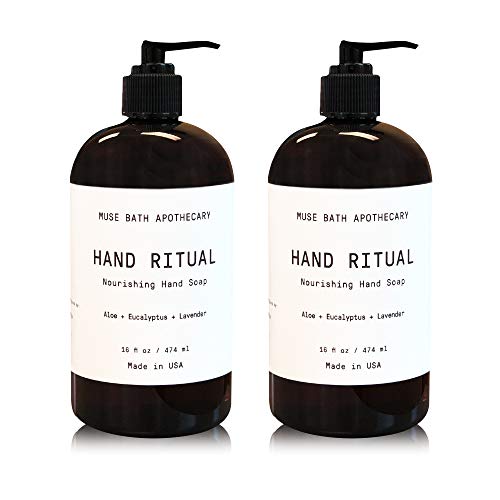
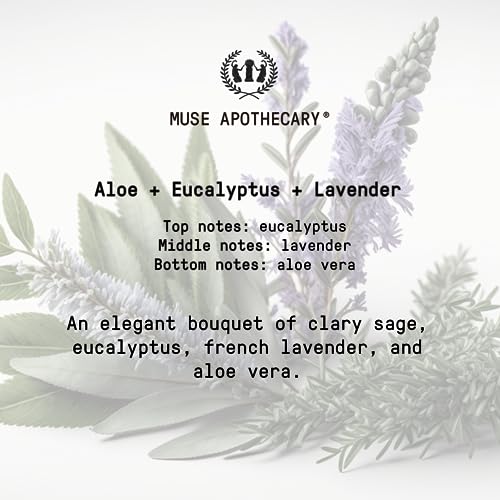
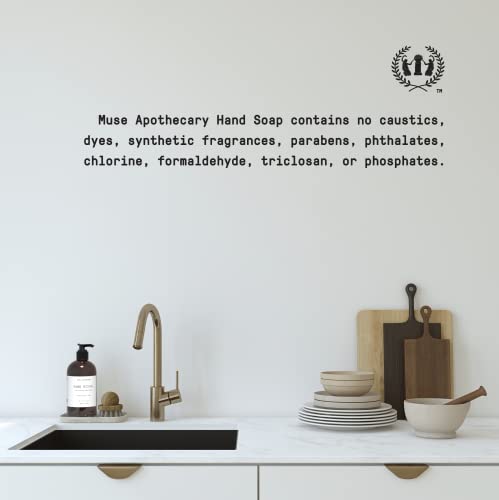
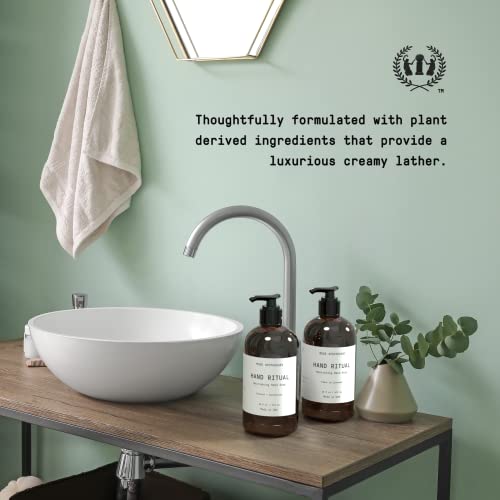
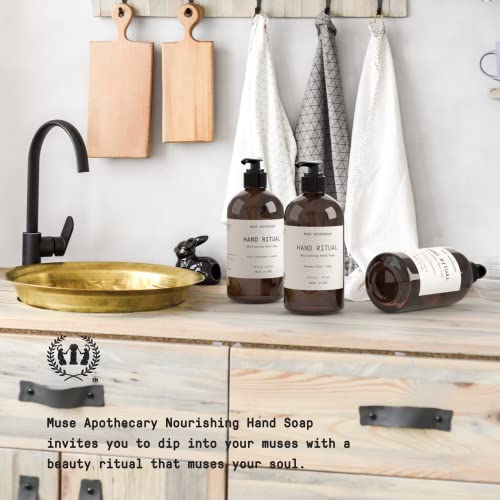
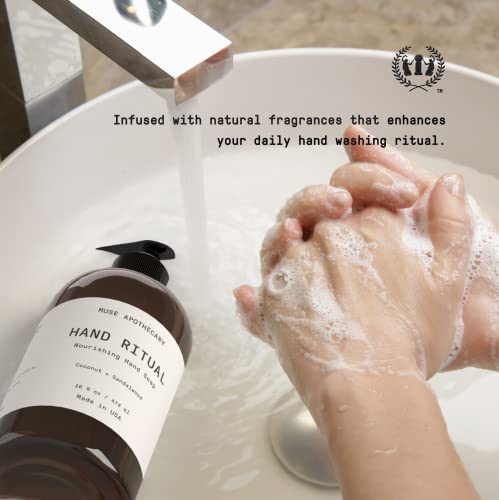

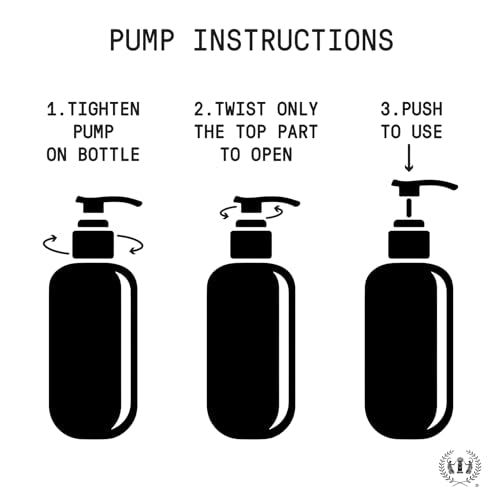
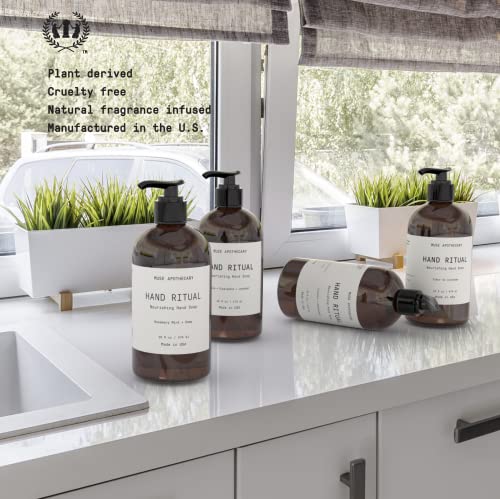
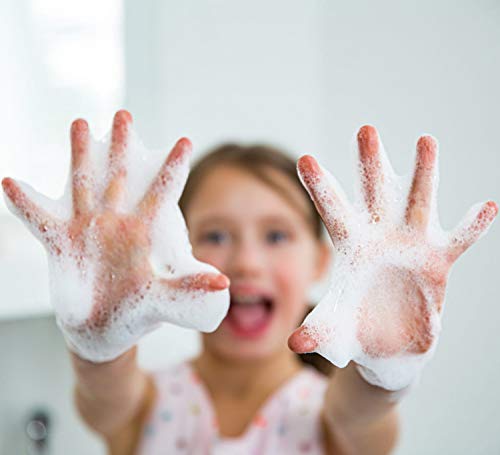
Muse Apothecary Hand Ritual - Nourishing Aromatherapy Hand Soap with Aloe & Lavender - 16oz, 2 Pack


Methylisothiazolinone
High RiskMethylisothiazolinone is a widely-used preservative in cosmetic and personal care products, known for its antimicrobial properties. It helps prevent the growth of bacteria and fungi, extending the shelf life of formulations. It is often used in leave-on and rinse-off products, including lotions and shampoos.
Sustai Insights
Methylisothiazolinone serves as an effective preservative, combating microbial growth in various personal care items. However, it is associated with a high risk of allergic reactions and skin sensitization, especially in individuals exposed repeatedly. Regulatory bodies have imposed use restrictions due to these health concerns. Additionally, while it is not considered a carcinogen, its environmental impact includes potential pollutant characteristics. Overall, the risk associated with methylisothiazolinone is high, prompting caution and consideration of safer alternatives.
Cocamidopropyl Betaine
High RiskCocamidopropyl betaine is a synthetic surfactant derived from coconut oil, commonly used in personal care products for its mild cleansing and foaming properties. It functions as a surfactant, emulsifier, and thickening agent, contributing to the texture and performance of formulations.
Sustai Insights
Cocamidopropyl betaine offers functional benefits as a gentle surfactant, enhancing product foaming and texture. However, it may pose low to moderate allergenic risks and is subject to high use restrictions due to contamination concerns. Regulatory bodies have advised on its safe levels of usage, categorizing its risk level as high overall. Users should practice caution, particularly with sensitive populations, and consider alternatives like naturally derived surfactants for safer formulations.
Sodium Laureth Sulfate
Medium RiskSodium laureth sulfate is a surfactant derived from natural sources, primarily coconut or palm oil. It is commonly used in personal care products for its ability to create lather and enhance cleansing properties. This ingredient is frequently found in shampoos, body washes, and other cleansing formulations.
Sustai Insights
Sodium laureth sulfate effectively acts as a surfactant, contributing to the foaming and cleansing action in various products. It is typically biodegradable and derived from renewable resources. However, it can cause skin irritation in sensitive individuals and may pose risks if used in high concentrations. Regulatory bodies have verified its safety at established levels, though some products may impose restrictions on its use. Overall, the risk associated with sodium laureth sulfate is considered moderate, making safe usage practices essential.
Citric Acid
Medium RiskCitric acid is an alpha hydroxy acid used in personal care products primarily for its role as a pH adjuster and natural preservative. It occurs naturally in citrus fruits and is commonly utilized in various formulations for its chelating properties and mild exfoliation benefits.
Sustai Insights
Citric acid offers functional benefits as an effective preservative and pH stabilizer, contributing to product longevity and stability. It is biodegradable and derived from renewable sources. Health risks are low, with minimal concerns regarding carcinogenicity, allergies, and reproductive toxicity. However, moderate use restrictions exist due to potential irritation at high concentrations. Environmental risks are limited, as citric acid is not known to accumulate in ecosystems. Regulatory agencies have no significant advisories against its use. Overall, it is assessed as a medium-risk ingredient, with safe usage practices recommended and alternatives available.
Vegetarian Glycerin
Low RiskVegetarian glycerin, also known as glycerol, is a colorless, odorless, and viscous liquid derived from plant sources. It is primarily used as a humectant, solvent, and emollient in various personal care products, helping to retain moisture and improve texture.
Sustai Insights
Vegetarian glycerin offers functional benefits as an effective humectant, promoting hydration and skin smoothness. It is biodegradable and typically sustainably sourced. Health risks associated with glycerin are low, with no significant concerns for carcinogenicity, allergens, or reproductive toxicity. Environmental risks are minimal, and it is not subject to major regulatory warnings. Overall, the risk level for this ingredient is low, making it a safe choice in formulations. Safe usage practices include ensuring proper concentrations in products, and alternatives such as propylene glycol exist but may have differing properties.
Water
Low RiskWater is a clear, colorless liquid essential for various biological processes. It serves as a solvent in formulations, facilitating the dissolution of other ingredients and enhancing product texture and application. Additionally, water plays a crucial role in hydration and is a key component in many cosmetic and personal care products.
Sustai Insights
Water is an effective solvent and hydrator, contributing to the texture and efficacy of formulations. It is biodegradable and generally regarded as safe, with low concerns regarding carcinogenicity, allergies, and reproductive toxicity. However, excessive water usage can lead to environmental concerns, particularly regarding resource depletion. Regulatory bodies do not impose restrictions on water use in cosmetics. Overall, the risks associated with water are low, making it a safe and essential ingredient.
Peg 55
Low RiskPEG-55 is a polymer of ethylene oxide commonly used as a surfactant and emulsifier in cosmetic and personal care products. It helps to improve the texture and stability of formulations by aiding in the mixing of oil and water-based ingredients.
Sustai Insights
PEG-55 offers functional benefits as an effective emulsifier, enhancing product performance. It has a low risk of health concerns, including carcinogenicity, allergies, and reproductive toxicity, and is not associated with significant environmental hazards. Regulatory bodies have not imposed serious restrictions on its use. Overall, it presents a low risk, making it a viable ingredient in formulations. Safe usage practices should be followed, and alternatives like plant-based emulsifiers may be considered for increased sustainability.
Sea Salt
Low RiskSea salt is a mixture of inorganic salts derived primarily from the evaporation of seawater. It consists mainly of sodium chloride, with minor amounts of other minerals. Sea salt is commonly used as a seasoning and preservative in food products and may also have applications in cosmetics and personal care items.
Sustai Insights
Sea salt serves as an effective flavor enhancer and preservative, contributing to the taste and shelf-life of food products. It is generally considered safe with low risk for health concerns such as cancer, allergies, and reproductive toxicity. Environmental impact is minimal, as it does not contribute significantly to pollution or bioaccumulation. Regulatory bodies, including the FDA, currently do not impose restrictions on its use. Overall, the risk level associated with sea salt is low, making it a widely accepted ingredient with no significant adverse effects reported.
Magnesium Nitrate
Low RiskMagnesium nitrate is an inorganic salt commonly used as a dehydrating agent, fertilizer, and in various industrial applications. It plays a role in providing magnesium and nitrogen, essential nutrients for plant growth and development.
Sustai Insights
Magnesium nitrate has functional benefits including serving as a source of magnesium and nitrogen, beneficial for agricultural applications. Health risks are generally low, with minimal concerns regarding carcinogenicity, allergenic potential, or reproductive toxicity. Environmental risks are also low, as it does not significantly contribute to pollution or bioaccumulation, and it is not under any specific regulatory restrictions. Overall, the ingredient is assessed to pose a low risk, highlighting its safety and utility in appropriate applications.
Methylisothiazolinone
High RiskMethylisothiazolinone is a widely-used preservative in cosmetic and personal care products, known for its antimicrobial properties. It helps prevent the growth of bacteria and fungi, extending the shelf life of formulations. It is often used in leave-on and rinse-off products, including lotions and shampoos.
Sustai Insights
Methylisothiazolinone serves as an effective preservative, combating microbial growth in various personal care items. However, it is associated with a high risk of allergic reactions and skin sensitization, especially in individuals exposed repeatedly. Regulatory bodies have imposed use restrictions due to these health concerns. Additionally, while it is not considered a carcinogen, its environmental impact includes potential pollutant characteristics. Overall, the risk associated with methylisothiazolinone is high, prompting caution and consideration of safer alternatives.
Vegetarian Glycerin
Low RiskVegetarian glycerin, also known as glycerol, is a colorless, odorless, and viscous liquid derived from plant sources. It is primarily used as a humectant, solvent, and emollient in various personal care products, helping to retain moisture and improve texture.
Sustai Insights
Vegetarian glycerin offers functional benefits as an effective humectant, promoting hydration and skin smoothness. It is biodegradable and typically sustainably sourced. Health risks associated with glycerin are low, with no significant concerns for carcinogenicity, allergens, or reproductive toxicity. Environmental risks are minimal, and it is not subject to major regulatory warnings. Overall, the risk level for this ingredient is low, making it a safe choice in formulations. Safe usage practices include ensuring proper concentrations in products, and alternatives such as propylene glycol exist but may have differing properties.
Water
Low RiskWater is a clear, colorless liquid essential for various biological processes. It serves as a solvent in formulations, facilitating the dissolution of other ingredients and enhancing product texture and application. Additionally, water plays a crucial role in hydration and is a key component in many cosmetic and personal care products.
Sustai Insights
Water is an effective solvent and hydrator, contributing to the texture and efficacy of formulations. It is biodegradable and generally regarded as safe, with low concerns regarding carcinogenicity, allergies, and reproductive toxicity. However, excessive water usage can lead to environmental concerns, particularly regarding resource depletion. Regulatory bodies do not impose restrictions on water use in cosmetics. Overall, the risks associated with water are low, making it a safe and essential ingredient.
Cocamidopropyl Betaine
High RiskCocamidopropyl betaine is a synthetic surfactant derived from coconut oil, commonly used in personal care products for its mild cleansing and foaming properties. It functions as a surfactant, emulsifier, and thickening agent, contributing to the texture and performance of formulations.
Sustai Insights
Cocamidopropyl betaine offers functional benefits as a gentle surfactant, enhancing product foaming and texture. However, it may pose low to moderate allergenic risks and is subject to high use restrictions due to contamination concerns. Regulatory bodies have advised on its safe levels of usage, categorizing its risk level as high overall. Users should practice caution, particularly with sensitive populations, and consider alternatives like naturally derived surfactants for safer formulations.
Sodium Laureth Sulfate
Medium RiskSodium laureth sulfate is a surfactant derived from natural sources, primarily coconut or palm oil. It is commonly used in personal care products for its ability to create lather and enhance cleansing properties. This ingredient is frequently found in shampoos, body washes, and other cleansing formulations.
Sustai Insights
Sodium laureth sulfate effectively acts as a surfactant, contributing to the foaming and cleansing action in various products. It is typically biodegradable and derived from renewable resources. However, it can cause skin irritation in sensitive individuals and may pose risks if used in high concentrations. Regulatory bodies have verified its safety at established levels, though some products may impose restrictions on its use. Overall, the risk associated with sodium laureth sulfate is considered moderate, making safe usage practices essential.
Peg 55
Low RiskPEG-55 is a polymer of ethylene oxide commonly used as a surfactant and emulsifier in cosmetic and personal care products. It helps to improve the texture and stability of formulations by aiding in the mixing of oil and water-based ingredients.
Sustai Insights
PEG-55 offers functional benefits as an effective emulsifier, enhancing product performance. It has a low risk of health concerns, including carcinogenicity, allergies, and reproductive toxicity, and is not associated with significant environmental hazards. Regulatory bodies have not imposed serious restrictions on its use. Overall, it presents a low risk, making it a viable ingredient in formulations. Safe usage practices should be followed, and alternatives like plant-based emulsifiers may be considered for increased sustainability.
Sea Salt
Low RiskSea salt is a mixture of inorganic salts derived primarily from the evaporation of seawater. It consists mainly of sodium chloride, with minor amounts of other minerals. Sea salt is commonly used as a seasoning and preservative in food products and may also have applications in cosmetics and personal care items.
Sustai Insights
Sea salt serves as an effective flavor enhancer and preservative, contributing to the taste and shelf-life of food products. It is generally considered safe with low risk for health concerns such as cancer, allergies, and reproductive toxicity. Environmental impact is minimal, as it does not contribute significantly to pollution or bioaccumulation. Regulatory bodies, including the FDA, currently do not impose restrictions on its use. Overall, the risk level associated with sea salt is low, making it a widely accepted ingredient with no significant adverse effects reported.
Citric Acid
Medium RiskCitric acid is an alpha hydroxy acid used in personal care products primarily for its role as a pH adjuster and natural preservative. It occurs naturally in citrus fruits and is commonly utilized in various formulations for its chelating properties and mild exfoliation benefits.
Sustai Insights
Citric acid offers functional benefits as an effective preservative and pH stabilizer, contributing to product longevity and stability. It is biodegradable and derived from renewable sources. Health risks are low, with minimal concerns regarding carcinogenicity, allergies, and reproductive toxicity. However, moderate use restrictions exist due to potential irritation at high concentrations. Environmental risks are limited, as citric acid is not known to accumulate in ecosystems. Regulatory agencies have no significant advisories against its use. Overall, it is assessed as a medium-risk ingredient, with safe usage practices recommended and alternatives available.
Magnesium Nitrate
Low RiskMagnesium nitrate is an inorganic salt commonly used as a dehydrating agent, fertilizer, and in various industrial applications. It plays a role in providing magnesium and nitrogen, essential nutrients for plant growth and development.
Sustai Insights
Magnesium nitrate has functional benefits including serving as a source of magnesium and nitrogen, beneficial for agricultural applications. Health risks are generally low, with minimal concerns regarding carcinogenicity, allergenic potential, or reproductive toxicity. Environmental risks are also low, as it does not significantly contribute to pollution or bioaccumulation, and it is not under any specific regulatory restrictions. Overall, the ingredient is assessed to pose a low risk, highlighting its safety and utility in appropriate applications.
Experience the luxurious Muse Apothecary Hand Ritual, a nourishing hand soap infused with natural essential oils like aloe, eucalyptus, and lavender. This 16 oz, 2-pack is your daily wellness ritual for clean, refreshed hands.
- Gentle Nourishment: Formulated for all skin types, this hand soap soothes and moisturizes without leaving a sticky residue, making it perfect for sensitive skin.
- Aromatherapy Benefits: Infused with calming essential oils, it transforms handwashing into a soothing experience, delighting your senses with every use.
- Natural Ingredients: Crafted with a plant-based formula, this vegan soap is free from harsh chemicals, parabens, and EDTA, ensuring a safe wash for you and your family.
- Mindful Ritual: Each wash not only cleans but also hydrates, creating a mindful moment in your day that enhances your well-being.
- Perfect Gift: Ideal for any occasion, this hand soap makes a thoughtful gift for loved ones, promoting self-care and mindfulness in everyday routines.
Subscribe & Save with Sustai
- Best Price Guarantee: Always enjoy the lowest prices on sustainable home essentials.
- No Surprises: We’ll notify you before shipping. No hidden fees, ever.
- You’re in Charge: Change, pause, or cancel your subscription anytime with ease.
- Eco-Friendly Deliveries: Our grouped shipments mean less packaging and lower emissions.
Join us on a sustainable journey. Special offers for a limited time! Prices and promotions may change.
Recommended Products
Experience the luxurious Muse Apothecary Hand Ritual, a nourishing hand soap infused with natural essential oils like aloe, eucalyptus, and lavender. This 16 oz, 2-pack is your daily wellness ritual for clean, refreshed hands.
- Gentle Nourishment: Formulated for all skin types, this hand soap soothes and moisturizes without leaving a sticky residue, making it perfect for sensitive skin.
- Aromatherapy Benefits: Infused with calming essential oils, it transforms handwashing into a soothing experience, delighting your senses with every use.
- Natural Ingredients: Crafted with a plant-based formula, this vegan soap is free from harsh chemicals, parabens, and EDTA, ensuring a safe wash for you and your family.
- Mindful Ritual: Each wash not only cleans but also hydrates, creating a mindful moment in your day that enhances your well-being.
- Perfect Gift: Ideal for any occasion, this hand soap makes a thoughtful gift for loved ones, promoting self-care and mindfulness in everyday routines.

You can have at most 2 Sustainable Steals products in your cart
Customer Reviews
Customers’ View
Customers express a generally positive sentiment towards the Hand Soap | Aromatic Nourishment, highlighting its luxurious lather and moisturizing properties. Many appreciate the natural essential oils that contribute to its pleasant scent, making hand washing a more enjoyable experience. The soap is noted for being gentle on the skin, with several users mentioning that it leaves their hands feeling soft and hydrated, even with frequent use. However, feedback regarding the pump functionality has been a concern, as numerous customers reported issues with pumps not working correctly. Aesthetically, the amber-colored bottles receive praise for their elegant design, adding a touch of luxury to any bathroom. Overall, while there are mixed opinions on its value for money, customers find the product's quality aligns well with their eco-conscious and health-oriented values.
AI-generated from the text of customer reviewsThis product is rated 4.3 of 5.0 stars.
It has received 41 reviews.




